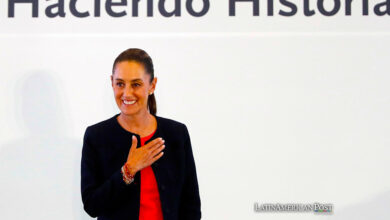Argentina’s Milei’s Diplomatic and Economic Pivot
President-elect Javier Milei's U.S. visit marks a strategic shift in Argentina's foreign policy and economic recovery plans, with crucial talks at the White House and IMF.

Photo: 11/28/2023.- Argentina’s president-elect Javier Milei (C) departs the White House complex. EFE/EPA/JIM LO SCALZO
Latin American Post Staff
Escucha este artículo
Leer en español: El giro diplomático y económico de Milei en Argentina
High-Level Discussions in Washington Signal Milei's Diplomatic Focus
Argentina's president-elect, Javier Milei, has embarked on a pivotal mission to reshape the nation's foreign policy and steer its economy out of a severe crisis. On Tuesday, Milei engaged in high-level discussions with top U.S. officials in Washington and coordinated closely with his economic team, who deliberated with International Monetary Fund (IMF) officers.
Emerging from the White House, Milei described his meeting as "excellent," which included engagements with Jake Sullivan, the U.S. national security adviser, and Juan Gonzalez, the National Security Council's senior director for the Western Hemisphere. According to Milei, the talks centered on Argentina's current economic and social landscape.
Milei's Positive Outlook Following Talks with U.S. Officials
Milei, a far-right libertarian set to assume office on December 10, rose to power despite promises for radical economic reforms. His plans include dollarization and implementing "shock" austerity measures to address Argentina's staggering inflation rate, nearing 150%, dwindling foreign currency reserves, and an impending recession.
His foreign policy stance is distinctly pro-United States and pro-Israel, marking a significant shift from the country's current orientation towards crucial trade partners like Brazil and China. Benjamin Gedan, director of the Latin America program at the Wilson Center in Washington, describes Milei as a "unicorn" in Latin American politics due to his overtly pro-American position.
Despite earlier criticisms, Milei's team has shown signs of moderating their stance towards China and Brazil's leftist government. However, Milei's U.S. visit before his inauguration clearly favors his diplomatic priorities. He has also publicly committed to not joining the China-led BRICS trade group, contrasting sharply with the approaches of outgoing President Alberto Fernandez.
The IMF Challenge: Renegotiating Argentina's $44 Billion Deal
The pressing issue for Milei is the renegotiation of Argentina's $44 billion deal with the IMF, where the U.S. plays a crucial role as the fund's largest shareholder. His advisors' meeting with IMF officials is a critical step in this process. Argentina, currently the IMF's largest global debtor, has struggled to adhere to its repayment program, initially established to address a failed $57 billion loan in 2018.
Milei's campaign included a bold proposal to dollarize South America's second-largest economy. Although this idea is on hold, he addresses the deep fiscal deficit and soaring inflation. He remains committed to radically transforming the mandate of Argentina's central bank.
The IMF has previously stated that dollarization cannot replace sound macroeconomic policies. The current administration's lack of an orthodox policy framework and increased central bank-financed spending during the presidential campaign have exacerbated Argentina's economic woes.
Pivotal Moment: Milei's Diplomatic Outreach Shapes Argentina's Future
Milei's first virtual meeting with IMF officials on Friday was termed "very constructive" by IMF Managing Director Kristalina Georgieva. Milei's office clarified that the engagement with the IMF was to communicate the incoming team's economic plan, not to seek additional financing. However, Georgieva indicated in an interview with Reuters that the IMF is "very keen" to support Argentina, suggesting the possibility of additional funding through a trust for middle-income countries.
Also read: Impact of Milei's Presidential Win on YPF and Financial Markets
Milei's strategic diplomatic outreach and discussions with the IMF signify a pivotal moment in Argentina's economic and foreign policy trajectory. As he prepares to take office, the world watches to see how his administration will navigate these challenges and potentially redefine Argentina's role on the global stage. The success of these initial engagements could set the tone for Milei's presidency, influencing Argentina's economic recovery and its international relations in the coming years.




